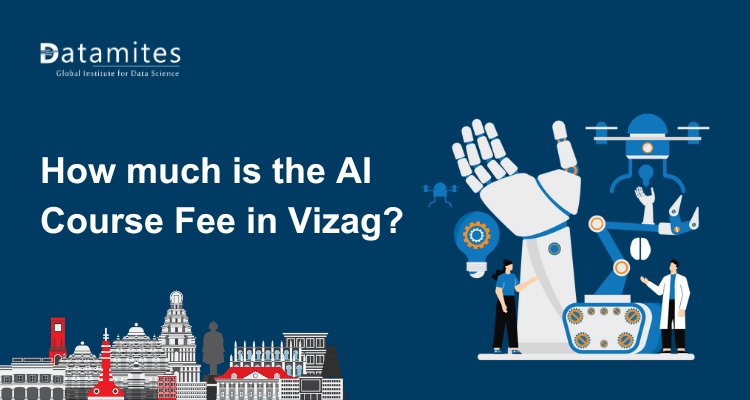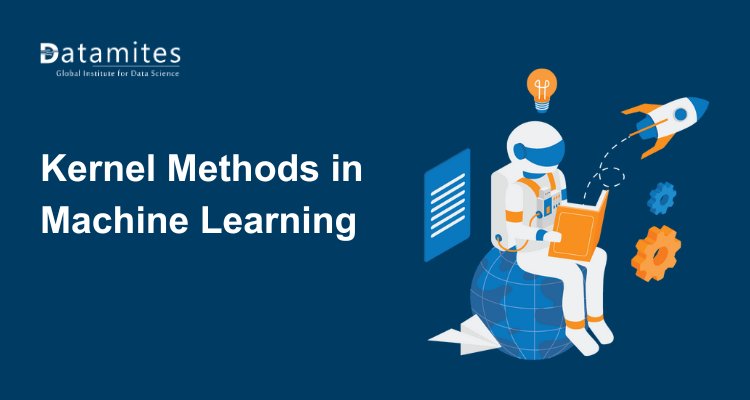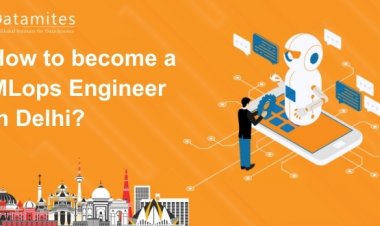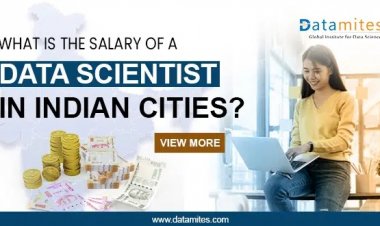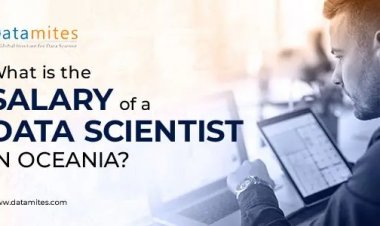Breaking Into Data Science: Ankita’s Story of Success
Ankita’s journey into data science highlights her determination and strategic learning approach that led to her career breakthrough. Her story inspires aspiring data scientists to overcome challenges and achieve success.
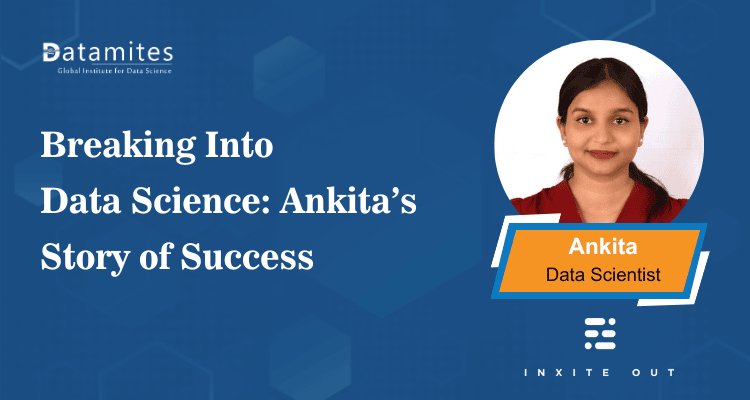
In today’s rapidly evolving tech landscape, data science has become one of the most sought-after and rewarding career paths. But the journey from a beginner to a professional data scientist or AIML engineer is often challenging, filled with learning curves, interview hurdles, and continuous skill enhancement. To shed light on this journey, we recently caught up with Ankita, a data science professional who transitioned from a student to an AIML engineer and then to a data scientist role.
Ankita’s story is a perfect example of dedication, continuous learning, and strategic career planning. Below, we walk you through her experiences, the challenges she faced during interviews, her advice for freshers, and her views on the evolving role of AI in the workforce.
How Ankita Successfully Transitioned into Data Science with DataMites
Ankita leveraged hands-on training, real-world projects, and expert guidance at DataMites to build the skills and confidence needed for a seamless career shift into data science.
Q1: Can you tell us a bit about your educational background and how you got interested in data science?
I graduated with a degree in Electrical and Electronics Engineering from New Horizon College of Engineering. I’ve always been passionate about numbers and data analytics, which naturally led me to explore data science more deeply.
Q2: How did you get introduced to Datamites and what made you enroll in their course?
Two of my friends, who are also Datamites alumni, recommended the Certified Data Science course to me. Their positive experiences encouraged me to enroll, and it turned out to be a great decision that built a solid foundation for my career.
Q3: What was your first role after completing the course?
I started as an intern in 2022 with Datamites. After that, I got placed as a full-time AIML engineer at Cogvision, a company focused on computer vision and video analytics solutions.
Q4: What does your current role look like?
Recently, I transitioned to a data scientist role at Inxite Out. It’s an exciting new chapter and a significant milestone in my professional journey.
Q5: What was your interview preparation like? Did you face more theoretical or practical questions?
Interview preparation was definitely challenging. Many people assume fresher interviews are easier, but that’s not true. You must be clear on both theory and practice. For example, the first round is usually Python coding, regardless of experience level. I prepared extensively with the help of Datamites lecturers and online resources. Understanding basics in Python, machine learning algorithms, and data science concepts was crucial. I gave multiple interviews and learned from each one, which helped me improve and finally land the job.
Q6: How many interviews did you give before you got placed?
I lost count, but roughly three to four interviews. Sometimes I got eliminated in the first round due to Python coding, which I initially struggled with. The key is to keep practicing and learning from your mistakes.
Q7: To what extent should freshers learn Python? Is mastering advanced concepts like OOP necessary?
For freshers, mastering the basics of Python is most important — data types, basic syntax, and using Python effectively for machine learning tasks. While Object-Oriented Programming (OOP) concepts can be useful, they’re not essential at the start. Focus on basics, then gradually build up your skills as you gain experience.
Q8: How was your interview experience different after gaining two years of work experience?
The interviews got much tougher. While fresher interviews generally have two rounds, my later interviews had six or seven rounds including screening, technical discussions with senior data scientists, managers, and even CTOs. There were coding rounds, machine learning assignments, and scenario-based questions—especially relevant to my experience in computer vision. The expectations were higher, and the questions were more in-depth.
Q9: What tips would you give to freshers aspiring to build a career in data science?
Be honest in your resume; never lie about your skills or projects because you’ll be caught. Projects are very important—know them inside out. Be clear about your strengths and weaknesses. Most importantly, solidify your basics before moving to advanced topics. A simple, well-structured resume highlighting your skills and projects will get you noticed.
Q10: How did you go about your job search after your first placement? Any advice on platforms or strategies?
Job searching can be tough, especially for the second or third job. I kept in touch with Datamites and leveraged their alumni network. I also polished my LinkedIn profile, which played a big role in my recent job search. For those seeking new opportunities, having a strong LinkedIn presence and being clear about your skills and goals is crucial.
Q11: What is your take on AI potentially replacing human jobs?
I don’t believe AI will completely take over jobs anytime soon. Technology is advancing rapidly, but it also creates new roles. For instance, if AI automates one part, humans will be needed to manage other aspects. People need to adapt and embrace these changes. AI can make some tasks easier, but it cannot fully replace the human element—especially in complex problem-solving and creativity.
Q12: Can you walk us through your daily routine as a data scientist and the kinds of challenges you face?
At Cogvision, I led a team working on video analytics. My day included gathering client requirements, data collection, processing, model training, and sometimes deployment. I was involved in cloud-related tasks but not fully responsible for deployment. Now, at Inxite Out, I’m focused on training models and improving data workflows. Challenges usually revolve around understanding client needs clearly and handling real-world messy data. Time management and keeping up with the latest tech trends are also important.
Q13: What is your current role like as a Data Scientist at Inxite Out?
It's been 2–3 weeks since I joined. I'm mainly focused on training ML models and handling data pipelines. At Cogvision, I was more involved with video analytics and computer vision. Now it's broader, and I’m learning more every day.
Q14: What challenges do you face in your daily routine as a data scientist?
Understanding client requirements, handling data cleaning, training and tweaking models, and collaborating with cross-functional teams. Time management and staying updated with new tools are key challenges.
Q15: Final advice to freshers aspiring to become data scientists?
Be clear with your basics. Start small but stay consistent. Don’t get demotivated by failures in interviews. Keep learning, keep trying. And most importantly, never fake your knowledge—be honest and keep improving.
Refer these articles:
- Khushi J’s Leap Into Data Science: A Story of Self-Belief
- Aditya Chowdari’s Inspiring Path to Success in Data Science
- From UPSC Aspirant to Data Scientist: Kiran’s Journey to Success
Key Takeaways from Ankita’s Journey into Data Science
Ankita’s inspiring transition from engineering graduate to data science professional highlights the power of upskilling, determination, and choosing the right learning platform.
- Solid Foundation is Crucial: Strong understanding of Python, ML algorithms, and data manipulation are essential for cracking interviews.
- Projects Speak Louder Than Words: Real, hands-on projects in your resume make a difference. Understand them thoroughly.
- Resilience Pays Off: Ankita didn’t land a job on her first try. It took several attempts to learn, adapt, and finally succeed.
- Transitioning is Possible: Coming from a non-CS background (Electrical & Electronics), Ankita proves that transitioning into data science is entirely possible with the right training and attitude.
- Resume Authenticity Matters: Be truthful about what you know and have done. Overstating skills can cost you the job.
- LinkedIn is Powerful: A well-curated LinkedIn profile can open doors to new job opportunities. Use it wisely.
- Interview Expectations Grow with Experience: As you gain years in the field, interview processes become more rigorous and multi-layered.
- Never Stop Learning: Learning doesn’t stop once you get a job. Continue upskilling in Python, AI, and related technologies.
- AI Won’t Replace You, But It Will Change the Landscape: Embrace AI, adapt to its advancements, and look for areas where your human intuition still adds value.
Refer these articles:
Ankita’s journey from a curious engineering graduate to a data scientist is a motivational blueprint for aspiring professionals. With determination, support from platforms like DataMites, and a commitment to continuous learning, success in the data science world is more achievable than ever.
Whether you're just starting out or seeking your next leap in the AI-ML domain, take a page from Ankita’s book: start with the basics, build real skills, be honest, and never stop exploring.
If you're considering a career transition into data science, Ankita’s story is a powerful reminder that there's no better time to make the move. According to IMARC Group, the global data science platform market reached USD 15.2 billion in 2024 and is projected to soar to USD 144.9 billion by 2033, growing at a CAGR of 27.08% from 2025 to 2033. With demand for skilled data professionals rising rapidly, Ankita recognized the opportunity early and chose to upskill through a program that emphasized practical learning, real-time project experience, and dedicated placement support—the key pillars for growing in today’s competitive tech environment. Enrolling in a data science course in Pune, Bangalore, Hyderabad, Chennai, Mumbai, and Delhi can be the first step toward building a strong tech career.
She chose to enroll with DataMites Institute, a trusted name in Data Science, AI, Machine Learning, Python Development, and Data Analytics training. Backed by accreditations from IABAC and NASSCOM FutureSkills, DataMites provided Ankita with expert-led sessions, practical experience, and career guidance that enabled a smooth transition into the data field.
With flexible learning options—including offline data science training in Pune, Bangalore, Hyderabad, Chennai, Ahmedabad, Coimbatore, and Mumbai—Ankita was able to pick a format that matched her schedule and learning preferences. Regardless of her original background in engineering, the industry-aligned curriculum and mentorship at DataMites empowered her, just like many others, to carve out a growing career in the data science domain.


